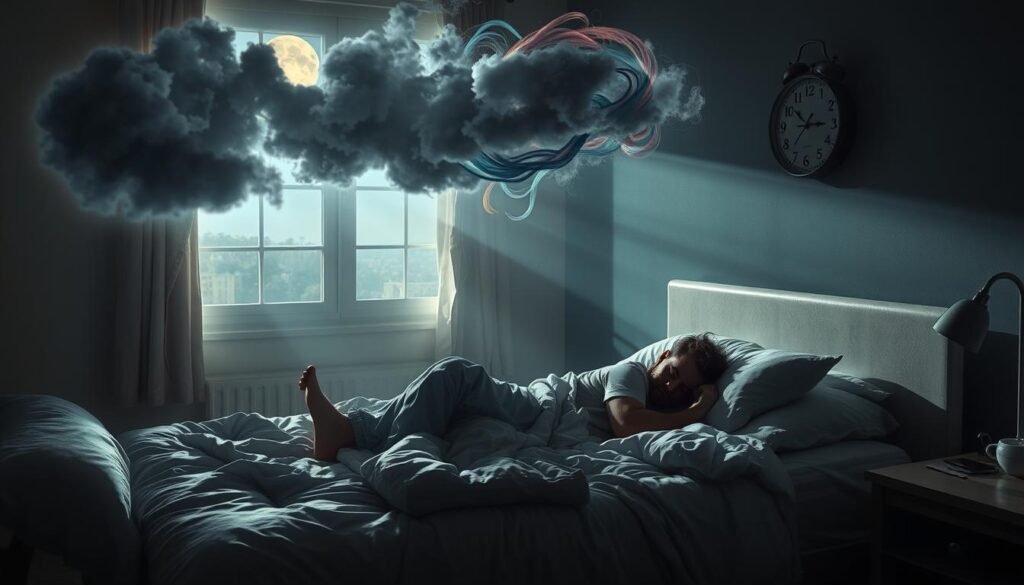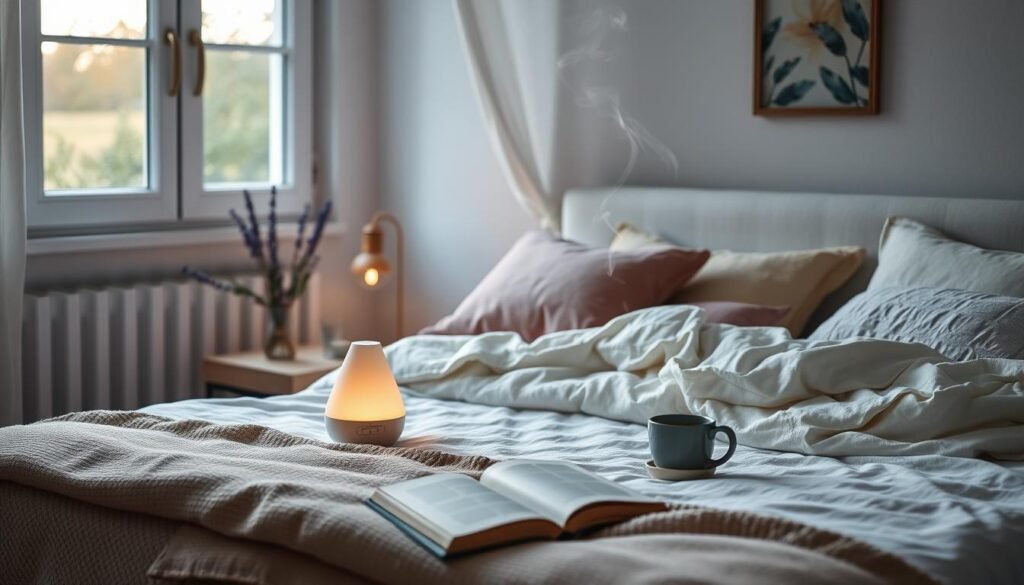Did you know over 10 percent of Americans battle chronic insomnia? This fact underscores the urgency to tackle terminal insomnia. People with this condition wake up often during the night and find it hard to fall back asleep. Because of this, they face daytime tiredness, moodiness, and decreased mental sharpness. Understanding terminal insomnia is crucial for finding the right treatment and getting the peaceful sleep we all need.
In this article, we’ll look at ways to improve sleep quality. From setting a regular bedtime to considering sleep therapy like Cognitive Behavioral Therapy for Insomnia (CBT-I), there’s a variety of solutions for beating insomnia. With dedication and the proper management of sleep disorders, achieving restful nights is possible.
Key Takeaways
- Chronic insomnia is diagnosed when sleep issues occur at least three times a week for three months.
- Terminal insomnia can severely impact daily concentration and productivity.
- Creating a structured sleep environment can play a critical role in promoting better sleep.
- Stress and anxiety are significant contributors to the prevalence of terminal insomnia among individuals.
- Cognitive Behavioral Therapy for Insomnia (CBT-I) is an effective treatment for improving sleep quality.
Understanding Terminal Insomnia
Terminal insomnia is a special kind of sleeping problem. It means waking up too early and not being able to sleep again. People who have this issue don’t sleep well overall. This can make them do poorly during the day and feel bad.
About 10% of people have chronic insomnia. This means it’s quite common. Short-term sleep problems can affect up to 30% of people, usually because of stress. Unlike short-term problems, chronic insomnia lasts longer. It happens at least three nights a week for over three months.
This kind of insomnia often means you can’t stay asleep. It leads to feeling tired and thinking less clearly. Mental health issues like anxiety and depression can make it worse. These problems go both ways with poor sleep.
Learning more about terminal insomnia helps us spot its symptoms and impacts. Researchers are working hard to find better ways to treat it. The goal is to help people with this tough sleep disorder.
Types of Insomnia and Their Distinctions
Understanding the types of insomnia is key for managing sleep disorders well. Knowing the categories helps people find the right treatment for their sleep issues. Here are the main types:
- Transient Insomnia: This type lasts a few nights to weeks. Stress or changes in the environment can trigger it.
- Acute Insomnia: Up to 37 percent of people experience this. It’s short-term and often due to life events.
- Chronic Insomnia: This affects about 12 percent of Americans. It means trouble sleeping three times a week for three months or more. It can lead to serious health problems.
- Middle (Maintenance) Insomnia: This involves waking up often during the night. Nearly two-thirds of chronic insomnia sufferers have it.
- Sleep-Onset Insomnia: This is when you have trouble falling asleep at the start of the night.
- Psychophysiological Insomnia: You feel tired during the day but can’t relax at night.
- Paradoxical Insomnia: You think you’re awake all night, but you’re actually sleeping enough.
- Behavioral Insomnia of Childhood (BIC): This affects children due to environmental factors or lack of sleep habits.
- Drug-Induced Insomnia: Medications or substances cause this type of sleep disruption.
- Sleep Hygiene Insomnia: Bad habits or a bad sleep environment lead to this kind of insomnia.
Insomnia can wreak havoc on your mental health and focus. Issues like poor attention, executive functioning, and concentration can get worse. By identifying the exact type of insomnia, you can get specific treatment. This is the path to better sleep.
| Type of Insomnia | Characteristics | Impact on Health |
|---|---|---|
| Transient Insomnia | Short-term, stress-related | Minimal |
| Acute Insomnia | Up to 37% affected, lasts days or weeks | Potentially higher health risks |
| Chronic Insomnia | Occurs three times a week for three months | Increased risk of heart disease, diabetes, etc. |
| Middle (Maintenance) Insomnia | Difficulties staying asleep | High prevalence among chronic insomnia sufferers |
| Sleep Hygiene Insomnia | Poor sleep habits | Exacerbates insomnia symptoms |
Identifying the Causes of Terminal Insomnia
Terminal insomnia has many causes that disturb sleep. People face many insomnia triggers, from mental to physical issues. Stress and anxiety are big factors, making people feel restless at night.
Some causes are due to health problems. For example, chronic pain from conditions like arthritis or fibromyalgia ruins sleep. This kind of pain leads to frustration and trouble finding peaceful sleep. Also, breathing problems can make sleep even harder to find.
Mental health is also a huge factor. Depression and PTSD often come with sleeping problems. Symptoms include tiredness, trouble starting to sleep, and feeling hopeless. It’s important to know these causes of insomnia for managing sleep well.
Knowing what triggers your insomnia helps find the right treatment. Making small changes in life can improve sleep a lot. Setting a regular bedtime, exercising, and cutting back on caffeine and alcohol help. Plus, turning off screens before bed makes a big difference in sleep quality.
| Category | Common Causes | Potential Remedies |
|---|---|---|
| Psychological | Stress, Anxiety, Depression, PTSD | Cognitive Behavioral Therapy (CBT), Relaxation Techniques |
| Medical | Chronic Pain (Arthritis, Fibromyalgia), Respiratory Issues | Pain Management, Medical Consultation |
| Lifestyle | Inconsistent Sleep Schedule, High Caffeine/Alcohol Intake | Regular Sleep Routine, Limit Stimulants |
Impact of Stress and Anxiety on Sleep Quality
Stress and anxiety can really mess with sleep, leading to a cycle where not getting enough rest makes these mental health issues worse. People dealing with a lot of stress might struggle to chill out enough to fall asleep. When you’re stressed all the time, your body stays in fight-or-flight mode, making it hard to get any rest.
The link between stress, anxiety, and not sleeping well has a lot to do with brain chemicals. Some chemicals make you more alert, while others help you relax and sleep. Stress and anxiety can throw off the balance of these chemicals, hurting your sleep quality.
Stressful times might cause short-term insomnia due to changes in your routine. Even though it’s temporary, this type of insomnia can affect many nights. On the flip side, chronic insomnia is a bigger issue tied to ongoing stress and can increase the risk of depression.
Stress also makes your body produce certain proteins that can mess up your sleep patterns. These proteins can make it tough to get good rest. Understanding these connections can help find ways to treat insomnia when anxiety is a factor. For more info on how stress and anxiety impact sleep, check out more here.

Terminal Insomnia Treatment Strategies
To tackle terminal insomnia, a blend of strategies is essential for better sleep. Effective terminal insomnia treatment combines behavior changes and relaxation techniques for insomnia relief. CBT-I stands out as a promising approach.
Cognitive Behavioral Therapy for Insomnia (CBT-I)
CBT-I helps individuals change thoughts and habits that affect their sleep. Studies show it improves sleep over time. Typically, a CBT-I plan includes 6 to 8 sessions, but it can vary. Around 80% of users report better sleep. It focuses on:
- Stimulus control to create a better sleep setting
- Sleep restriction to improve overall sleep time
- Homework like sleep diaries and fixing negative thoughts
Learning good sleep habits often leads to big improvements in sleep quality. Benefits include falling asleep faster, sleeping longer, and waking up less at night.
Relaxation Techniques for Improved Sleep
Besides CBT-I, relaxation methods also play a crucial role in sleep therapy. They relax the mind and body for sleep. Some effective techniques are:
- Progressive muscle relaxation for easing body tension
- Mindfulness meditation for present-moment focus and anxiety reduction
- Deep breathing exercises to slow the heart rate and relax
Applying these techniques fosters a serene state, easing the way into sleep. Many with terminal insomnia find lasting improvement in sleep quality this way.
| Strategy | Focus | Effectiveness | Duration |
|---|---|---|---|
| CBT-I | Thought and behavior modification | 70% – 80% improvement | 6 – 8 sessions |
| Progressive Muscle Relaxation | Tension release | Helpful for immediate relaxation | Variable |
| Mindfulness Meditation | Anxiety reduction | Calmness before sleep | Variable |
| Deep Breathing | Heart rate lowering | Ease into relaxation | Variable |
Medical Conditions Associated with Insomnia
Insomnia is a big problem for many people. It is often caused by various health issues. Studies show that 10% to 30% of adults in the U.S. have trouble sleeping. This issue is frequently linked to health conditions like chronic pain, breathing problems, and stomach issues.

For example, chronic pain can make it hard to sleep. This issue can ruin the quality of your sleep. Problems like asthma or sleep apnea can also disturb your sleep, making you wake up often during the night.
Stomach troubles, such as acid reflux or irritable bowel syndrome, might affect your sleep too. These issues often get worse at night and can prevent you from sleeping well. It’s important to check for these medical conditions because understanding the cause can help treat your sleep problems better.
People with sleep issues should see a doctor for a full check-up. This can help find the links between insomnia and health problems. Knowing the full picture helps doctors come up with the right treatment. Treating both sleep problems and other health issues is important for better sleep.
| Medical Condition | Impact on Sleep | Management Strategies |
|---|---|---|
| Chronic Pain | Difficulty falling/staying asleep | Medication, physical therapy |
| Respiratory Disorders | Frequent awakenings, disrupted sleep cycles | Use of CPAP, lifestyle changes |
| Gastrointestinal Issues | Discomfort leading to sleep interruption | Diet modifications, medications |
Understanding these connections helps in treating sleep problems effectively. It enables health experts to give care that addresses both the insomnia and its related conditions.
Sleep Hygiene: Best Practices for Better Sleep
Good sleep hygiene is key to beating terminal insomnia. Adding certain habits can greatly improve how well you sleep. Here’s what you can do to sleep soundly.
Creating a Sleep-Conducive Environment
Designing the right sleep space is critical for overcoming insomnia. The level of noise, how much light there is, and your mattress affect your sleep. Try these ideas to make your bedroom better for sleeping:
- Keep the room dark using blackout curtains to minimize light exposure.
- Control noise levels with earplugs or white noise machines.
- Select a comfortable mattress and pillows that support restful sleep.
- Maintain a cooler room temperature, ideally between 60-67°F (15-19°C).
- Avoid electronic devices at least an hour before bedtime.
Establishing a Consistent Sleep Schedule
Keeping a regular sleep schedule helps your body’s clock work better, leading to improved sleep. Try to sleep and wake at the same time every day to fight terminal insomnia. Here are steps to create a good routine:
- Go to bed and wake up at the same time each day, even on weekends.
- Limit daytime naps to 20-30 minutes if necessary.
- Engage in a relaxing pre-sleep ritual, such as reading or meditating.
- Be mindful of caffeine and alcohol intake, especially in the hours leading up to sleep.
Using these sleep hygiene tips can really help your sleep quality. Making your bedroom sleep-friendly and sticking to a regular sleep time are big steps toward peaceful nights.
Sleep Deprivation Solutions: Techniques and Tips
Sleep problems can really impact your everyday life, especially if you’re dealing with ongoing insomnia. To get back to sleeping well, it’s key to find the right strategies. Here we’ll talk about how to get better sleep with some useful tips and techniques.
To start, sleep restriction therapy is about only staying in bed when you’re actually sleeping. This method strengthens the link between your bed and sleep. As your sleep gets better, you’ll slowly spend more time in bed.
Regular exercise, like taking walks or doing yoga, can help you feel more awake during the day. It also helps you sleep better at night. Try to get moving three to four times a week for about 20-30 minutes.
Good sleep hygiene is super important. Stick to a regular bedtime, make sure your room is dark and quiet, and skip exciting activities before bed. These habits are key for battling insomnia.
Try to limit your caffeine intake, especially in the later hours. Caffeine can mess with your sleep cycle more than you might think. Also, avoid eating big meals or drinking alcohol before bed to sleep better.
If you find yourself waking up in the middle of the night, try to stay calm. Keeping your cool can help you fall back asleep faster without worrying too much.

Here’s a quick overview of some sleep strategies and how they can help:
| Technique | Benefits |
|---|---|
| Sleep Restriction Therapy | Makes bed and sleep more connected |
| Moderate Exercise | Raises energy during day, betters sleep at night |
| Consistent Sleep Schedule | Helps set your body clock for improved sleep |
| Avoiding Stimulants | Leads to fewer sleep interruptions |
| Calm Mindset After Waking | Helps return to sleep faster if you wake at night |
Follow these sleep tips consistently, and you’ll likely see your sleep improve. Sticking to these methods can help solve your insomnia, letting you enjoy peaceful nights once again.
Over-the-Counter and Prescription Sleep Medications
Finding the right treatment for insomnia can lead people to try different sleep medications. Both kinds – over-the-counter (OTC) and drugs prescribed by doctors – help in managing insomnia briefly. For example, the sales of prescription sleep aids reached $7.1 billion in 2017 around the world. This shows how much they’re used.
OTC sleep aids, like diphenhydramine and doxylamine, made $691 million in 2019 in the U.S. They can help temporarily, but they have side effects such as feeling drowsy the next day and thinking less clearly. Using alcohol to fall asleep is also common but not advised. It upsets the sleep balance and could become a habit.
Prescription options like Dayvigo and daridorexant (Quviviq) offer new hope for struggling with insomnia. Studies have shown daridorexant can make sleep better and help people fall asleep faster. But, these meds could make you feel nauseous, dizzy, or tired.
Talking to healthcare experts before starting any drug is important. Being careful is important because many sleeping pills can cause dependency and other bad reactions. Finding the right medication means looking at the good and bad. It also means thinking about treatments without drugs, like cognitive behavioral therapy for insomnia (CBT-I), which works well for 70-80% of patients.
| Medication Type | Examples | Common Side Effects | Considerations |
|---|---|---|---|
| Over-the-Counter | Diphenhydramine, Doxylamine | Next-day sedation, cognitive impairment | Monitor for dependence, potential interactions |
| Prescription | Dayvigo, daridorexant (Quviviq), Ambien, trazodone, eszopiclone | Nausea, dizziness, headache | Consult healthcare providers for safe use |
Understanding sleep medications is key for anyone facing insomnia. The importance of carefully choosing between insomnia treatment options and understanding side effects is increasing. This comes as up to 10% of adults may face chronic insomnia eventually. For more on how medications affect sleep, visit credible sources to learn about the side effects and sleep problems here.
Conclusion
Terminal insomnia can really affect your sleep quality and daily life. It’s important to know the different types of insomnia, like acute or chronic. This helps choose the right treatment. Cognitive Behavioral Therapy for Insomnia (CBT-I) is a good option. Over 70% of people find insomnia relief with CBT-I.
Improving your sleep habits is also key. Try to go to bed and wake up at the same time every day. Make sure your sleeping environment helps you relax. Natural aids like melatonin or lavender aromatherapy might help you sleep better. Remember, what works can vary from person to person.
Beating terminal insomnia is possible with the right steps. Look for treatments that cater to your needs. Taking control of your sleep leads to a happier, healthier life.